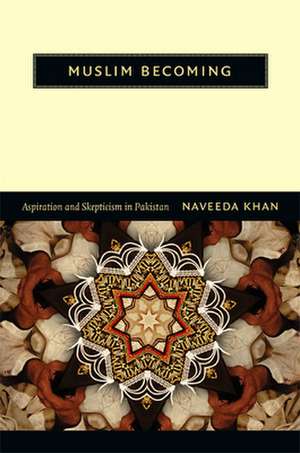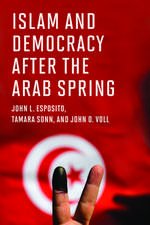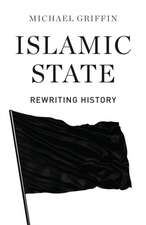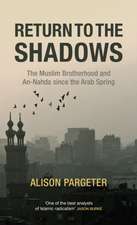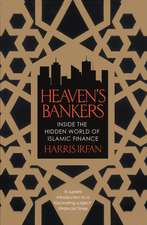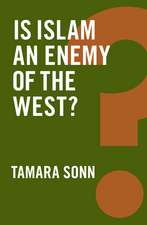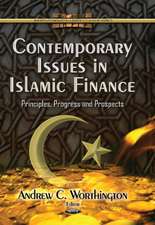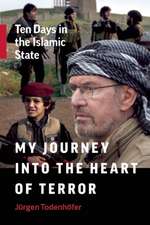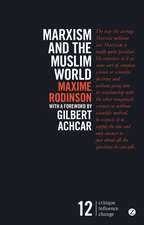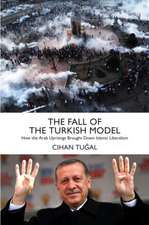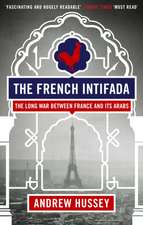Muslim Becoming – Aspiration and Skepticism in Pakistan
Autor Naveeda Khanen Limba Engleză Paperback – 21 mai 2012
| Toate formatele și edițiile | Preț | Express |
|---|---|---|
| Paperback (1) | 262.32 lei 6-8 săpt. | |
| MD – Duke University Press – 21 mai 2012 | 262.32 lei 6-8 săpt. | |
| Hardback (1) | 537.47 lei 3-5 săpt. | +22.15 lei 7-13 zile |
| Duke University Press – 30 apr 2012 | 537.47 lei 3-5 săpt. | +22.15 lei 7-13 zile |
Preț: 262.32 lei
Nou
Puncte Express: 393
Preț estimativ în valută:
50.19€ • 52.28$ • 41.84£
50.19€ • 52.28$ • 41.84£
Carte tipărită la comandă
Livrare economică 28 martie-11 aprilie
Preluare comenzi: 021 569.72.76
Specificații
ISBN-13: 9780822352310
ISBN-10: 0822352311
Pagini: 280
Ilustrații: 2 illustrations
Dimensiuni: 156 x 229 x 19 mm
Greutate: 0.41 kg
Editura: MD – Duke University Press
ISBN-10: 0822352311
Pagini: 280
Ilustrații: 2 illustrations
Dimensiuni: 156 x 229 x 19 mm
Greutate: 0.41 kg
Editura: MD – Duke University Press
Recenzii
Naveeda Khans book is a clear, original, and arresting argument about Pakistan as a state of becoming. Interested in nothing less than the formation of a new way of being Muslim in Pakistan, Khan argues that Muslim attempts at perfection in Pakistan are neither communal nor turned toward the past, but rather located in modern citizenship and aspirations toward an entirely novel future. This makes Islam more, rather than less, flexible there. Given the stereotypical and repetitive nature of so much writing about Pakistan today, Muslim Becoming is a breath of fresh air. It deserves to be widely read by academics, journalists, and policymakers. Faisal Devji, author of The Terrorist in Search of Humanity: Militant Islam and Global PoliticsMuslim Becoming is a powerful contribution to the literature on Islam in Pakistan, not to mention Islam more generally. Its argumentthat one has to understand religious practices and institutions in Pakistan in terms of striving or aspirationis original and quite provocative. Naveeda Khans subtle insights, novel ethnographic data, and fascinating analysis of Iqbals poetry and philosophical writings are remarkable too. Steven Caton, author of Yemen Chronicle: An Anthropology of War and Mediation"Tracing the ways that aspiration and skepticism are braided together in lives lived in dialogue with texts in contemporary Pakistan, Naveeda Khan gently shifts our angle of vision on the making and unmaking of Pakistan in everyday life. She thinks of aspiration as a striving for perfectibility, not perfection. This small shift of emphasis makes familiar phenomena, such as sectarian conflict, appear in a new light. Philosophically rich, written in a style that invites conversation, and ethnographically grounded in literary texts, as well as in the ordinary flows of neighborhood relations, Muslim Becoming surely deserves the designation of a modern classic."Veena Das, author of Life and Words: Violence and the Descent into the Ordinary
"Naveeda Khan's book is a clear, original, and arresting argument about Pakistan as a state of becoming. Interested in nothing less than the formation of a new way of being Muslim in Pakistan, Khan argues that Muslim attempts at perfection in Pakistan are neither communal nor turned toward the past, but rather located in modern citizenship and aspirations toward an entirely novel future. This makes Islam more, rather than less, flexible there. Given the stereotypical and repetitive nature of so much writing about Pakistan today, Muslim Becoming is a breath of fresh air. It deserves to be widely read by academics, journalists, and policymakers." Faisal Devji, author of The Terrorist in Search of Humanity: Militant Islam and Global Politics "Muslim Becoming is a powerful contribution to the literature on Islam in Pakistan, not to mention Islam more generally. Its argument - that one has to understand religious practices and institutions in Pakistan in terms of striving or aspiration - is original and quite provocative. Naveeda Khan's subtle insights, novel ethnographic data, and fascinating analysis of Iqbal's poetry and philosophical writings are remarkable too." Steven Caton, author of Yemen Chronicle: An Anthropology of War and Mediation "Tracing the ways that aspiration and skepticism are braided together in lives lived in dialogue with texts in contemporary Pakistan, Naveeda Khan gently shifts our angle of vision on the making and unmaking of Pakistan in everyday life. She thinks of aspiration as a striving for perfectibility, not perfection. This small shift of emphasis makes familiar phenomena, such as sectarian conflict, appear in a new light. Philosophically rich, written in a style that invites conversation, and ethnographically grounded in literary texts, as well as in the ordinary flows of neighborhood relations, Muslim Becoming surely deserves the designation of a modern classic." - Veena Das, author of Life and Words: Violence and the Descent into the Ordinary
"Naveeda Khan's book is a clear, original, and arresting argument about Pakistan as a state of becoming. Interested in nothing less than the formation of a new way of being Muslim in Pakistan, Khan argues that Muslim attempts at perfection in Pakistan are neither communal nor turned toward the past, but rather located in modern citizenship and aspirations toward an entirely novel future. This makes Islam more, rather than less, flexible there. Given the stereotypical and repetitive nature of so much writing about Pakistan today, Muslim Becoming is a breath of fresh air. It deserves to be widely read by academics, journalists, and policymakers." Faisal Devji, author of The Terrorist in Search of Humanity: Militant Islam and Global Politics "Muslim Becoming is a powerful contribution to the literature on Islam in Pakistan, not to mention Islam more generally. Its argument - that one has to understand religious practices and institutions in Pakistan in terms of striving or aspiration - is original and quite provocative. Naveeda Khan's subtle insights, novel ethnographic data, and fascinating analysis of Iqbal's poetry and philosophical writings are remarkable too." Steven Caton, author of Yemen Chronicle: An Anthropology of War and Mediation "Tracing the ways that aspiration and skepticism are braided together in lives lived in dialogue with texts in contemporary Pakistan, Naveeda Khan gently shifts our angle of vision on the making and unmaking of Pakistan in everyday life. She thinks of aspiration as a striving for perfectibility, not perfection. This small shift of emphasis makes familiar phenomena, such as sectarian conflict, appear in a new light. Philosophically rich, written in a style that invites conversation, and ethnographically grounded in literary texts, as well as in the ordinary flows of neighborhood relations, Muslim Becoming surely deserves the designation of a modern classic." - Veena Das, author of Life and Words: Violence and the Descent into the Ordinary
Notă biografică
Cuprins
Acknowledgments ix
Introduction 1
1. Scenes of Muslim Aspiration: Neighborhood Mosques and Their Qabza 21
2. A Possible Genealogy of Aspiration: Muhammad Iqbal in His Time 55
3. Inheriting Iqbal: The Law and the Ahmadi Question 91
4. The Singularity of Aspiration: A Father, a Child, and a Jinn 121
5. Skepticism in Public Culture: From the Jahil Maulwi to Mullaism 145
6. Skepticism and Spiritual Diagnostics: Iqbal, the Ulama, and the Literati 171
Epilogue: Becoming Present 201
Notes 209
Bibliography 225
Index 251
Introduction 1
1. Scenes of Muslim Aspiration: Neighborhood Mosques and Their Qabza 21
2. A Possible Genealogy of Aspiration: Muhammad Iqbal in His Time 55
3. Inheriting Iqbal: The Law and the Ahmadi Question 91
4. The Singularity of Aspiration: A Father, a Child, and a Jinn 121
5. Skepticism in Public Culture: From the Jahil Maulwi to Mullaism 145
6. Skepticism and Spiritual Diagnostics: Iqbal, the Ulama, and the Literati 171
Epilogue: Becoming Present 201
Notes 209
Bibliography 225
Index 251
Descriere
This thoughtful ethnography of Islam in Pakistan moves from the smallest scalea single worshiper striving to be a better Muslim who is seeking guidance at a neighborhood mosqueto the largest, examining the thought of poet and philosopher Muhammad Iqbal, considered to be the spiritual visionary of the country. While some have thought that Pakistan failed to become a true Muslim state, or that the states relation to Islam is insincere and political, Khan argues that the basis of Pakistans Islam is in argument and aspiration, the possibility of becoming rather than tied to a particular outcome. She traces these signs of aspiration and striving in readings of texts and everyday life.
